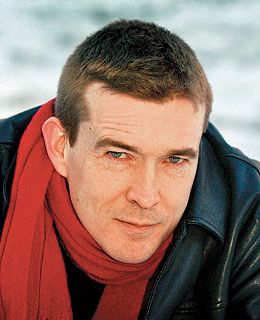
David Mitchell
David Mitchell served notice that he would be remaking the traditional novel when his first book, Ghostwritten, published in 1999 just after he turned 30, ingeniously braided together nine stories in eight countries and suggested that the same unchanging spirit ran through its central characters, whether in Hong Kong, St. Petersburg or a New York City radio station. Forget multiculturalism: this was novel globalism and an inquiry into what the boundary-dissolving author called transmigration.
Having created the 21st century novel with months to spare, Mitchell followed it up with a whole book in the voice of a Japanese 20-year-old and then, lest we get too settled, cooked up a Möbius strip of a narrative, Cloud Atlas, which begins in Melville's South Seas (rendered in vigorous 19th century pastiche), travels to a chilling next-generation North Korea and ends up in a post-apocalyptic world—only to circle back again, in reverse, to the 19th century Pacific.
That virtuosity tempts critics to place Mitchell next to such modern revolutionaries as Thomas Pynchon and David Foster Wallace. But he is tilling his own distinctive field, drawing from the U.S. (Paul Auster), England (Martin Amis) and Japan (Haruki Murakami) to nurture something entirely original and strangely rooted. His fourth novel, Black Swan Green, threw together ferocious language, a character from Cloud Atlas and a hypercharged imagination to light up from within the travails of an ordinary 13-year-old boy in England in 1982. The ultimate magician's trick: to make one believe there's no trick—and not even a magician.
Essayist and author Iyer's most recent novel is Abandon